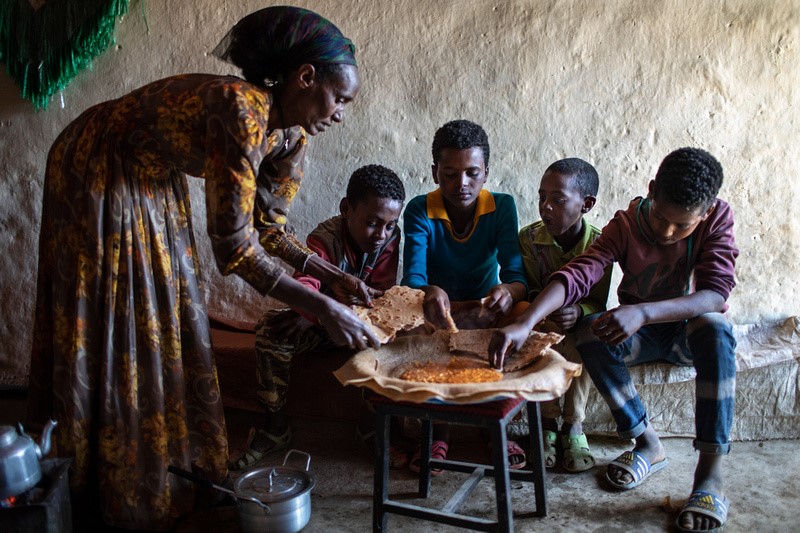
Catholic Relief Services is responding to food shortages in many African nations. (Photo courtesy of CRS Media Center)
With the impacts of the COVID-19 pandemic still reverberating around the world and expected to last longer, Catholic Relief Services (CRS) reports 14 countries are at risk of slipping deeper into food insecurity.
According to the Food Insecurity Analysis Report, the Democratic Republic of Congo, Nigeria, Somalia, Afghanistan, Yemen, Venezuela, Madagascar and Zimbabwe are among the 14 nations experiencing the world’s worst food crises. East and West Africa are the regions with the most significant number of “countries of concern.”
Robert Shelledy, Dignity of the Human Person Director and Social Justice Ministry Coordinator for the Archdiocese of Milwaukee, said CRS estimates that 150 million more individuals will be living in extreme poverty this year around the globe as well as many in our local communities.
“Anecdotally, our St. Sebastian/St. Catherine parish food pantry has numbers higher than they were three years ago, but fortunately, not as high they were last year in the middle of the pandemic,” Shelledy said. “In talking with the Vincentians, they are also concerned with an increase in evictions. The eviction moratorium ended, and as things move forward, landlords will understandably move to evict people behind on their rent.”
One positive outcome, Shelledy explained, were fewer utility disconnections than expected due to the moratorium on them. But with increased inflation, he expects those on the margins to suffer the most in all areas since they have no surplus.
“For most of us, we tighten our belts and (move) from product A, which costs $4, to an equivalent product that is at $3; but if you are at product C that is $2, there is nowhere to go lower than that,” he said. “Inflation is really hard, but particularly for those on the margins.”
The most significant issue with the decreased food supply is not necessarily a lack of food but being unable to move it from point A to point B, and that individuals cannot find access to it.
“Another thing that has been difficult is that people aren’t able to get into the fields, so you have a growing cycle that is COVID-related, and sometimes it is war and violence-related,” Shelledy said. “In Afghanistan, the planting season was chaotic and violent, and in parts of Africa, they are dealing with the locust invasion.”
CRS is working on a two-fold mission to provide emergent relief, bring necessary supplies and support local businesses to provide local resources to victims.
“One thing CRS realized over the last few years is that you want to get the local resources deployed ASAP, and it is frankly better to provide cash as opposed to in-kind donations, as it helps the local economy bounce back sooner,” Shelledy said. “If you show up with tons of rice, it can displace the local farmer and the economy. In a long-term situation like this, a combination of efforts works well. CRS does a good job with sustainable long-term agricultural practices, so farmers can grow more crops and more subsistent ones, as well as cash crops to build up the local economy. It helps the local economy to be more resilient, which is ultimately the goal for all different (forms of) charitable outreach. It is integral to human development to use God-given talents to support families, reflecting inherent dignity.”
Some of the recommendations for implementers of food security and livelihoods programming include:
- Preserve and scale up humanitarian assistance for food, nutrition, and livelihoods;
- Adapt assistance activities to local operating context, which includes adapting programming to prevent COVID-19 transmission to participants or changing/adapting response modalities;
- Minimize interruptions to food chains and ensure functioning and resilience of agri-food system;
- Support country governments with scaling up social protection services and strengthening basic service delivery—this includes safeguarding critical nutrition and school-based programs;
- Reach excluded groups, such as the isolated and the displaced, and consider the impact of COVID-19 on women and girls;
- Promote innovative data collection, monitoring and evaluation to inform programming; and
- Strengthen coordination and partnership with relevant stakeholders (e.g., peer agencies, government officials, food security/nutrition clusters, etc.).
To assist those dealing with food insecurity, the CRS Congress continues addressing the indirect impacts of the pandemic, especially hunger, while meeting public health needs, especially in critical areas.
Events such as the Oct. 24 CRS Helping Hands program raised awareness of hunger in the African country of Burkina Fasa. Volunteers created 20,000 meal packets serving six meals per packet for 120,000 meals in total for the hungry living there.
“Other things are the annual CRS Rice Bowl collection for the hungry and our parish ambassador program,” Shelledy said.
CRS parish ambassadors are active parishioners with a passion for global solidarity, who, with the blessing of their pastor, help strengthen the parish’s outreach ministry by organizing global discipleship activities. They coordinate three global solidarity initiatives a year in their parishes.
“We have about 10-15 members and recently held our fall retreat,” Shelledy said. “We are looking for more folks interested in CRS to become parish ambassadors.”
To learn more, or help CRS with funds for the hungry, visit CRS.org or contact Rob Shelledy at shelledyr@archmil.org.
